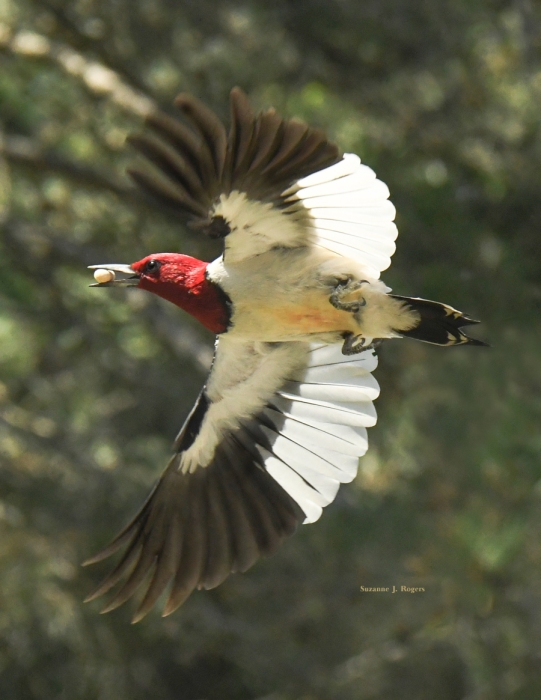All content on this site is copyrighted Suzanne J. Rogers, unless otherwise stated, all rights reserved. Excerpts and links may be used, provided proper credit is given. Many of the images that you see on this blog have been available on pixels.com for some time. As a result, images used or represented as belonging to any other individual can be easily refuted and prosecuted.
.




WOW! Great shot. Thank you dear Suzanne, Love, nia
LikeLike
The bird is really beautiful! You are a great photographer!
LikeLike
Wow! You are so kind!
LikeLiked by 1 person
Yep – The red-headed is beautiful. They always remind me of a model of one I had as a kid.
LikeLike
Really? Very cool.
LikeLike
Camera envy! And plumage envy- what colors!
LikeLiked by 1 person
Lol, I do love my camera. Resolution isn’t so hot here, but I resized the image so small that I knew the clarity was going to suffer. Have had a little problem with my images being, “borrowed.”
LikeLike
Super nice shot!
LikeLike
Thanks! Stay safe and stay well.
LikeLiked by 1 person
I saw the Red Headed Woodpecker all the time when I was younger, never see them now. Just this summer I had a Blue Jay at my bird bath, they have been absent for many years l, about the time the West Nile wiped many birds out😩. Thanks for all your beautiful pictures and cute stories. They make me smile😊
LikeLiked by 1 person
I never, ever saw a woodpecker when I was younger, let alone a Red Headed one. Yes, West Nile was terribly hard on the birds. I felt so bad for them. Well now you made me smile! Thanks for such lovely compliments, the best of which is that I can make someone smile with my images.
LikeLiked by 1 person
Such a sweet catch, Zanny!
LikeLike
Thanks! They’re so darn quick and visit so infrequently that I was really happy to capture this sweetheart.
LikeLike
I can imagine how thrilling it is to see this visitor. I’ve noticed too, that many of the songbirds that used to visit us here are either way down in numbers or they don’t show up at all. I think our songbirds are in big trouble.
LikeLiked by 1 person
It’s scary to think that they’re declining. One good thing here is that they have rebuilt the eagle population in our state. I now see one every so often and I can’t believe my eyes when I do. LOL, the white tail and white head are a dead giveaway though.
LikeLiked by 1 person
We have tons of eagles here, but fewer and fewer songbirds.
LikeLiked by 1 person
Is that due to the eagles?
LikeLiked by 2 people
No, I don’t think so. The eagles are here for the herring in about February and March, and they pick off the weakest ducks and any other unsuspecting small animal (like a friend’s chickens), but they are too big and clumsy to go after the songbirds. I think the decline in the songbird population might have to do with a combination of pesticides, lit up city buildings, and some habitat loss. I’d put my money on the pesticides first.
LikeLike
So disheartening. I didn’t know, and never thought about how many birds are lost because of tall buildings…so many fly into windows!
LikeLiked by 1 person
I once saw a program about all the high-rises in big cities leaving their lights on at night, and how birds flew into them and fell to the ground. Every morning the first-floor shopkeepers had to sweep up the dead birds from in front of their stores. I doubt if that has changed much. They still leave all those lights on. A waste of birds and a waste of electricity.
LikeLike
That’s awful!
LikeLiked by 1 person
Het is alsof je royalty ziet als het binnenvliegt. Dat is de enige manier waarop ik het kan omschrijven. Het hoofd ziet eruit als karmozijnrood fluweel en ik kan me bijna voorstellen dat het ook zo aanvoelt, maar ik weet dat het echt ‘veerzacht’ is, niet fluweelzacht.
LikeLiked by 1 person
I can almost understand this, but not quite.
LikeLike
Oh dear!!!!!!!!! LOLOLOLOLOLOLOL!
LikeLiked by 1 person
What a beautiful bird with magnificent colors
LikeLiked by 1 person
Het is alsof je royalty ziet als het binnenvliegt. Dat is de enige manier waarop ik het kan omschrijven. Het hoofd ziet eruit als karmozijnrood fluweel en ik kan me bijna voorstellen dat het ook zo aanvoelt, maar ik weet dat het echt ‘veerzacht’ is, niet fluweelzacht.
LikeLiked by 1 person